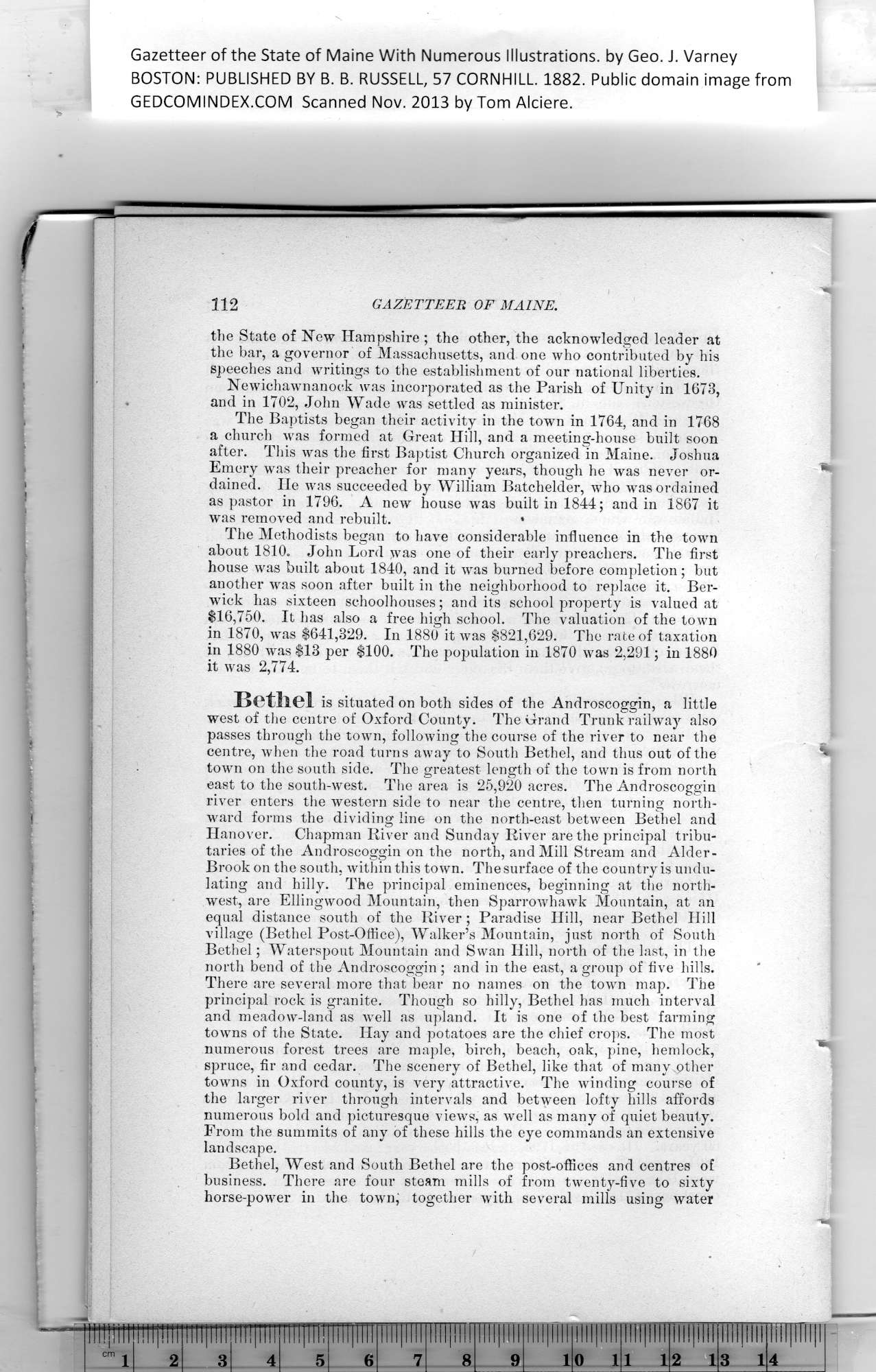|
Gazetteer of the State of Maine With Numerous Illustrations, by Geo. J. Varney
BOSTON: PUBLISHED BY B. B. RUSSELL, 57 CORNHILL. 1882. Public domain image from
112 GAZETTEER OF MAINE
the State of New Hampshire ; the other, the acknowledged leader at
the bar, a governor of Massachusetts, and one who contributed by his
speeches and writings to the establishment of our national liberties.
Newichawnanock was incorporated as the Parish of Unity in 1673,
and in 1702, John Wade was settled as minister.
The Baptists began their activity in the town in 1764, and in 1768
a church was formed at Great Hill, and a meeting-house built soon
after. This was the first Baptist Church organized in Maine. Joshua
Emery was their preacher for many years, though he was never or-
dained. He was succeeded by William Batchelder, who was ordained
as pastor in 1796. A new house was built in 1844; and in 1867 it
was removed and rebuilt. •
The Methodists began to have considerable influence in the town
about 1810. John Lord was one of their early preachers. The first
house was built about 1840, and it was burned before completion; hut
another was soon after built in the neighborhood to replace it. Ber-
wick has sixteen schoolhouses; and its school property is valued at
$16,750. It has also a free high school. The valuation of the town
in 1870, was $641,329. In 1880 it was $821,629. The rate of taxation
in 1880 was $13 per $100. The population in 1870 was 2,291; in 1880
it was 2,774.
Bethel is situated on both sides of the Androscoggin, a little
west of the centre of Oxford County. The Grand Trunk railway also
passes through the town, following the course of the river to near the
centre, when the road turns away to South Bethel, and thus out of the
town on the south side. The greatest length of the town is from north
east to the south-west. The area is 25,920 acres. The Androscoggin
river enters the western side to near the centre, then turning north-
ward forms the dividing line on the north-east between Bethel and
Hanover. Chapman River and Sunday River are the principal tribu-
taries of the Androscoggin on the north, and Mill Stream and Alder-
Brook on the south, within this town. The surface of the country is undu-
lating and hilly. The principal eminences, beginning at the north-
west, are Ellingwood Mountain, then Sparrowhawk Mountain, at an
equal distance south of the River ; Paradise Hill, near Bethel Hill
village (Bethel Post-Office), Walker’s Mountain, just north of South
Bethel; Waterspout Mountain and Swan Hill, north of the last, in the
north bend of the Androscoggin; and in the east, a group of five hills.
There are several more that bear no names on the town map. The
principal rock is granite. Though so hilly, Bethel has much interval
and meadow-land as well as upland. It is one of the best farming
towns of the State. Hay and potatoes are the chief crops. The most
numerous forest trees are maple, birch, beach, oak, pine, hemlock,
spruce, fir and cedar. The scenery of Bethel, like that of many other
towns in Oxford county, is very attractive. The winding course of
the larger river through intervals and between lofty hills affords
numerous bold and picturesque views, as well as many of quiet beauty.
From the summits of any of these hills the eye commands an extensive
landscape.
Bethel, West and South Bethel are the post-offices and centres of
business. There are four steam mills of from twenty-five to sixty
horse-power in the town, together with several mills using water
PREVIOUS PAGE ... NEXT PAGE
This page was written in HTML using a program written in Python 3.2
|
